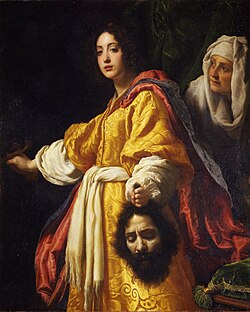
- To be distinguished from Giuditta a German operetta by Franz Lehár.
La Giuditta may refer to any one of several Italian oratorios, as elaborated below, treating the figure of Judith, from the Biblical Apocrypha, who liberated her besieged home town of Bethulia by seducing and then beheading Holofernes, commander of the forces laying the siege. Those are the two roles common to all versions; other characters, such as Achior in the first Scarlatti version, a captain so revolted by Holofernes' brutality that he defects, are incidental to one version.